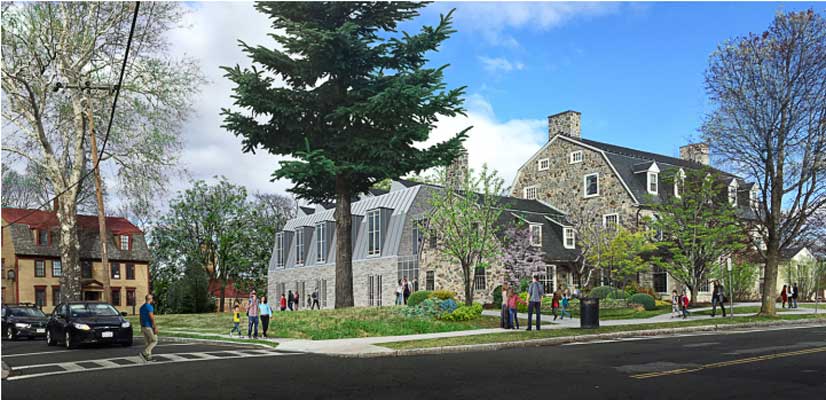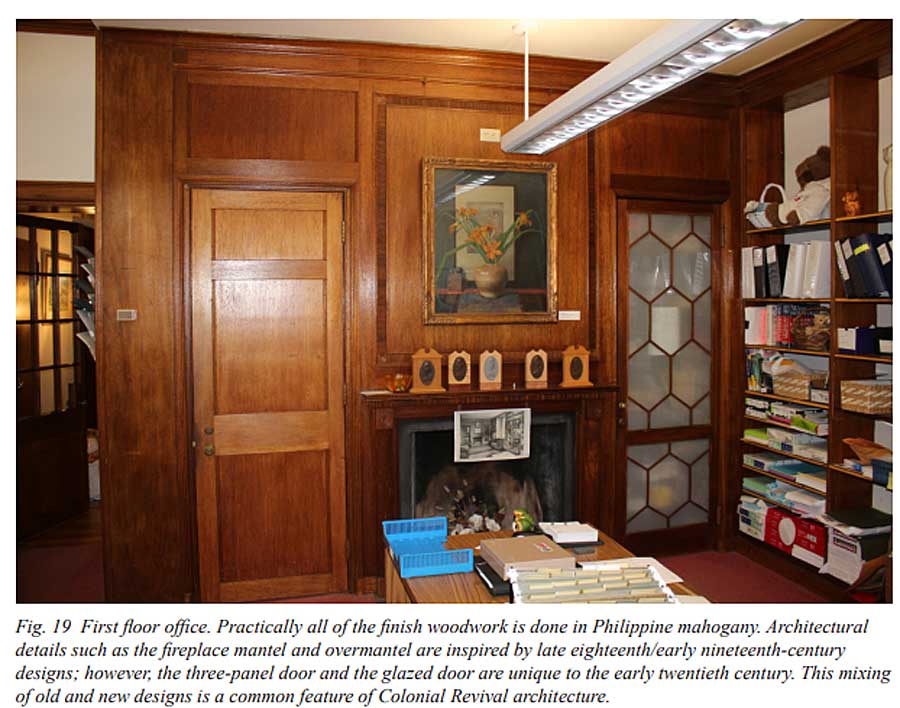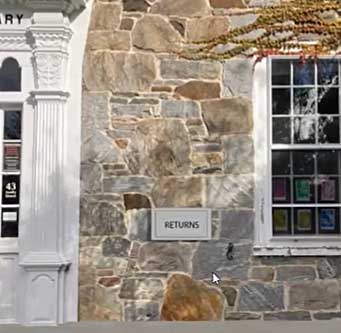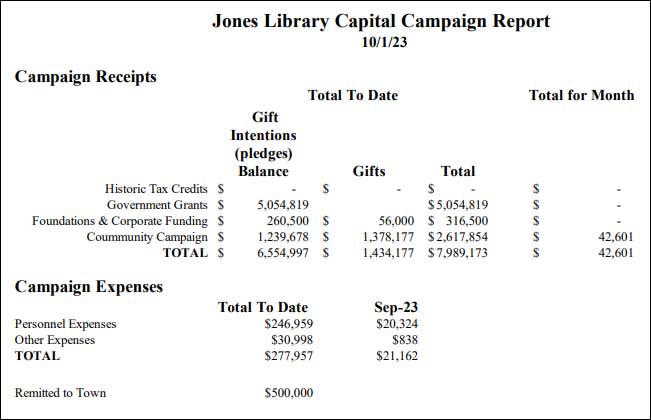Library Seeks Costly Book Sorter Despite Declining Book Circulation

Photo: https://www.joneslibrary.org/
$400K Apparatus Will Replace Historic Director’s Office
Statewide, Library Projects Change Course in the Face of Escalating Costs
At the October 19 public hearing to review the proposed Jones Library renovation-expansion project, the Amherst Historical Commission wrestled with options for locating a “book drop” in the front of the building. It soon emerged that the book drop consisted not only of a new opening to be cut into the historic building’s stonework, but also a large sorting device that uses an RFID tagging system to sort returned books into bins for shelving.
Designer Ellen Anselone of Finegold Alexander Architects asserted that, “the book drop is critical to the function of [a] library of this scale, so we evaluated where to put it.”
“We tried to put it in the side where the one of the existing entries is, but we could not fit the unit that sorts the books in the space behind there. It’s quite lengthy — I want to say it’s 20 feet.”
Because of its size, the materials handler which consists of a conveyor belt, tag reader and sorting bins must occupy the room that has served as the Director’s office since the library was built in 1928. The room has been cited in the town-commissioned Historic Structure Report for its Philippine mahogany woodwork and period design of its fireplace and glazed door.

Only commissioner Hetty Startup resisted accepting the claim that the book sorter is “critical” to library operations.
“I did go up to Greenfield and they’re not using it in their new library. They chose not to,” she reported.
Startup viewed the FAA design as an inappropriate shift. “What had been the library director’s office is now the mechanical book return system. It’s dissonant to me,” she protested.
Her argument received no support from the other historical commissioners.
See related Amherst Historic Commission: Jones Library Expansion Satisfies Historic Preservation Agreement
In a discussion of the automatic book sorter at an October 2022 meeting of the Jones Library Building Committee (JLBC) it was disclosed that the book sorter and RFID support were estimated to cost between $379,000 and $429,000. Project Manager Craig DiCarlo pointed out that the cost would need to come out of a $440,000 budget line item under Furniture, Fixtures & Equipment (FF&E). This line item also needs to cover audio/visual equipment for the renovated library. If the sorter comes in at the upper end of the range, said DiCarlo, “that would only leave enough funding for about one room’s A/V setup.”
The book sorter is not eligible to be purchased with state construction grant money and so must be paid for by library fundraising and town taxation.
A survey published by the Massachusetts Board of Library Commissioners (MBLC) in 2010 reported that only four public libraries in Massachusetts had installed an automated sorting system. A request to the MBLC for updated statistics has gone unanswered.
Jones Library circulation trends call into question whether the cost of a book sorter is justified.
In 2011, the total circulation of printed materials totaled 332,164 items. By 2022 total print circulation had dropped by 20% to 265,947.
Even more dramatic has been the move toward electronic delivery of library materials. In 2011 the Jones library circulated 259 items in an electronic format. Last year the number of electronically circulated items had grown to 82,057.
Neither the town nor the public has been asked whether the Library’s desire for an automatic book sorter is truly worth the destruction of a valued historical asset or the investment of tax dollars.

Statewide Library Projects Continue to Encounter a Rough Road
Itemlive.com reports that earlier this month Lynnfield Town Meeting members rejected borrowing money for a new $31 million library supported by a $9 million MBLC construction grant. The project cost represents a 72% increase over the original estimate of $18 million.
Noting that the town share of the project cost had risen from $10 million to $25 million, neither the Select Board nor the Finance Committee recommended the article’s approval.
Lynnfield currently has two other capital projects in the works – a public safety building renovation and a middle school project. Select Board member Dick Dalton described the new library as “not a need but a want.”
Lynnfield becomes the 11th of 33 libraries in the Massachusetts 2016-17 construction grant round to turn back a multi-million-dollar award. The Jones Library project, now $10 million over its original $36.3 million appropriation, will require approval of additional funding by two-thirds of the Town Council to move forward into construction. A new cost estimate is in progress and expected to be received next week.
See related Library Project Failures Expose Cracks In State Grant Program
Library Capital Campaign Opts to Keep Fundraiser Compensation Confidential
By agreement with the Town. The Jones Library Capital Campaign, co-chaired by trustee Lee Edwards and Amherst Forward PAC leadership team member, Kent Faerber, is required to regularly report its fundraising revenues and expenses. The Capital Campaign and Library are obligated to raise all funds beyond the April 2021 Town Council appropriation of $15.8 million plus borrowing costs estimated to total $9 million. The memorandum of agreement allows the Capital Campaign to deduct from its Town remittance “any direct and reasonable fundraising costs and expenses.”
The Capital Campaign Report of October 1 showed that campaign expenses have totaled $277,957 to date, including $246,959 in personnel expenses. Since these expenses must be made up by the taxpayers of Amherst, it seems reasonable that a detailed breakdown of fundraising expenses should be made available to the public.
The Amherst Indy has filed a Massachusetts Public Record Request to obtain an accounting of library project fundraising expenses, but the request, which had been forwarded to library director Sharon Sharry, was denied with the explanation that “the town does not track this information.” Because the Capital Campaign is a private non-profit corporation, it is permitted to keep the details of its finances out of view of the public.
In addition to Edwards and Faerber, Capital Campaign fundraisers include Matt Blumenfeld, Claudia Canale-Parola and Ginny Hamilton. Blumenfeld, Canale-Parola and Hamilton are all past members of the Amherst Forward leadership team.
The Amherst Forward PAC, formed in conjunction with Amherst’s passage of a new government charter, endorses candidates for the local election and provides them with campaign assistance. In the five years that the new form of government has existed, Amherst Forward has exclusively helped candidates who support town funding of the $46.1 million library renovation-expansion get elected.
See related Amherst Forward’s Influence Extends To Election Results, Government Policy
Is there a conflict of interest here?


Thanks to Jeff Lee and Hetty Startup for raising important questions about the Jones’ proposed nearly half-million dollar automated book sorter. Years ago I worked in the Circulation Department of the Olin graduate library at Cornell. It would have contained in the area of a million printed volumes at that time. All returned books were sorted by hand. Additionally, patrons borrowed books by handwriting both their and their book’s information on McBee cards. When overdue-book time came, our amateur bad-handwriting experts were often pressed into service. I’m sure that computerization of the system has made life much easier for current circulation staff.
That being said, while automation can make life easier, it comes with costs, and the questions that should be asked are: What is the total cost of this system, will this book sorter actually make life easier for library staff, and are the costs worth it?
I’m not sure exactly what “RFID support” is; I’m assuming that it is the yearly fee to keep the computerized part of the system working. I suspect what it does NOT include are the costs of getting all materials tagged — both the RFID tags themselves, and the cost of having staff do the tagging (since that process is likely not automated). The Waukesha, WI, Public Library spent $80,000 to tag materials for their automated sorting system (more on that later).
More questions arise: Which materials will be fed through the sorter? Is it every book that is returned to the library, or just those that are returned through the book drop? Will all materials be able to be sorted this way, or will some be unable to pass through the machine? Will all materials be tagged prior to the library’s reopening, or will it be an ongoing process, thus requiring continued sorting by hand? And most importantly, are current staff overwhelmed by book-sorting duties? Is sorting performed by various staff members, or is it left to a small cadre of part-time employees, whose jobs will be eliminated once the sorter is installed?
Finally, there is the fundamental question of the mechanical reliability of big machines with a lot of moving parts, which also include scanning and computerized components. Here’s the experience of the Waukesha Public Library, mentioned earlier: https://www.fox6now.com/news/frustrating-inefficient-and-slow-200k-library-book-sorter-still-cant-sort-books
There is no doubt that mechanized and automated systems can make life a lot easier in many ways. But that doesn’t mean that they are needed everywhere (think of Marty the Robot at Stop & Shop), and it doesn’t mean that they are a wise investment financially. It’s not terribly onerous to pick up a book and look at its call number. You might even find it’s a book you’d like to take home and read.
Thank you, Denise, for your insightful comments. By RFID support I meant what the OPM described as “RFID tags and associated equipment.” The estimated cost of this component was $150-200K.
What most aggravates me is the Jones Library’s long held attitude that they were given carte blanche in deciding how big and expensive to make the renovation-expansion project, and town leaders’ willingness to condone it. I guess it is easy to be cavalier when spending other people’s money.
Thanks to you both, Jeff and Denise, for these detailed and illuminating posts.
I would also ask: With what kind(s) of guarantee(s) does such a machine come? Also, who maintains library sorter machines? How swiftly can they respond to malfunctions in Amherst (e.g., must repair personnel come out from Boston?) How fast, or slowly, can they obtain spare parts? What does it cost, both for routine maintenance, which is presumably an annual amount, and repair?
Another point. During my tenure as a Library Trustee (2009-2012), one of the department heads told me that she got valuable information about patrons’ book-borrowing preferences from sorting the returned books. Do present library staff have a similar experience? Wouldn’t they lose this if a machine, at least when it works, takes over the function?
Also, what happens to books returned to the Munson Memorial and North Amherst branches? Presumably these will all continue to be sorted by hand, regardless of any RFID tags. And what about the books on interlibrary loan? These are almost certain to lack RFID tags, and thus need to be sorted by hand despite any costly machine.
As a related point, the Amherst Historical Commission apparently has no jurisdiction over the interior of an historic building, unless interior changes affect the exterior appearance. I might therefore also ask how the Jones Library thought leaders plan to get the Massachusetts Historical Commission’s assent to their obviously optional conversion of a historic office to house this huge machine.
The Jones Library is on the State and National Registers of Historic Places. See https://mhc-macris.net/, AMH.249-1; AMH.B. Public money is paying for this demolition/expansion project, even if it’s less than 100%. Accordingly, the Jones Library is no one’s private plaything.
Perhaps these thought leaders simply plan to continue ignoring the applicable Massachusetts Historic Preservation Law. As they, Amherst Town Council, the architects, and the Owner’s Project Manager know full well, this law is found at Title 9, Massachusetts General Laws, Sections 26 and 27C, and Title 950, Code of Massachusetts Regulations, Chapter 71.00: Protection of Properties Included in the State Register of Historic Places.
So I ask as well: where is it written that they are above the law?
As Sarah McKee astutely points out, an automatic book sorter is not likely to be much help with interlibrary loan (ILL) items received by the Jones Library, further diminishing its value. In 2022, according to the MBLC, the Jones received 40,458 items through ILL, equivalent to 15% of its print circulation.
Moreover, the items in the Jones Library collection are catalogued and located according to the widely used Dewey Decimal System, a classification system invented at Amherst College 150 years ago. Presumably a trained librarian can glance at a book’s call number and have a pretty good idea where it should be shelved.